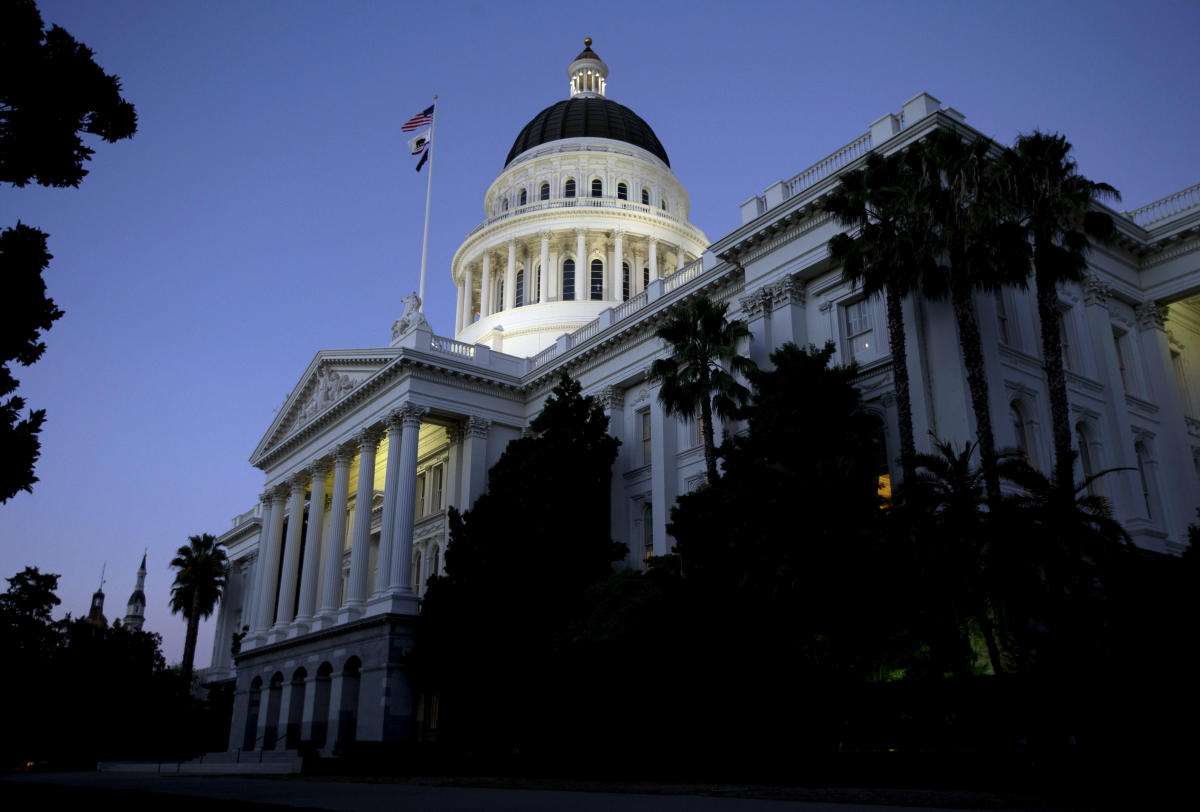SACRAMENTO, California — The official deadline to qualify measures for California’s ballot does not arrive until the end of June, but the most important machinations that will determine what appears — or, in many cases, doesn’t appear — before voters this fall are happening in May.
California’s Supreme Court will hear oral arguments Wednesday over a constitutional amendment that would make it harder to pass new state and local taxes and fees. At the same time, relatively quiet negotiations between interest groups and the Legislature over a handful of initiatives, including on workers’ rights and retail theft, will intensify throughout the month. Other measures, including a controversial proposal to limit recognition of transgender identity, are likely to fall short in delivering the required signatures by upcoming deadlines.
By May’s end, these developments are likely to have shortened and scrambled the statewide issue ballot, including in unanticipated ways. If one measure gets negotiated off the ballot or booted by the court, the various interest groups invested in it are likely to shift money and attention to other proposals that remain, altering the dynamics around those fights, too.
“Taking a look at the ballot as we think it’s going to exist in November, this is a pretty critical moment,” said Gale Kaufman, a political strategist who has worked on ballot measures for decades.
Full court press
The year’s most contentious ballot measure is about to have its day in court. Corrected line: On Wednesday morning, California’s Supreme Court will hear oral arguments over the constitutionality of the Taxpayer Protection and Government Accountability Act, which would amend the state constitution to require a majority of voters to approve all state tax increases and raise the thresholds to approve some types of local taxes to two-thirds of voters.
The proposal was developed by the California Business Roundtable and Howard Jarvis Taxpayers Association, which submitted the necessary signatures to qualify for the ballot more than a year ago. Newsom denounced the proposal as a “radical effort led by wealthy business interests.” Organized labor and progressive allies prepared to defeat the proposal whose passage they expect could constrain California’s policy ambitions for generations.
“Obviously this is something that has gotten their attention,” said Mark Baldassare, a Public Policy Institute of California pollster who frequently measures voter sentiment on ballot measures. “Which means not only does it have far-reaching implications, but they’re also not sure which way the wind is going to blow on this issue in November.”
Newsom and the Legislature, with backing from major labor groups, sued the business groups behind the measure last fall and saw their case immediately taken up by the state’s highest court. The suit argues that the proposal amounted to an “unlawful” revision of the California state constitution because it strips the governor and the Legislature of one of their basic powers, to impose or raise taxes. Under California law, a constitutional amendment can go directly to voters for approval, but a revision would first require a two-thirds vote in the Legislature or a Constitutional Convention.
Lawyers for Newsom and the business groups will each have 30 minutes to make their arguments before the court Wednesday morning. While there is no set timeline for a decision, most observers expect to see the case resolved within weeks. A ruling that the Taxpayer Protection Act amounts to a “constitutional revision” would be grounds to have it removed from the ballot.
Such action is rare, as the state supreme court has typically preferred to let voters weigh in before determining a measure’s legality. One recent exception came in 2018, when the court spiked a proposal to split California into three separate states, arguing that it represented a clear revision of the state constitution.
Were the Taxpayer Protection Act to be removed, it would have wide-ranging implications for the rest of the ballot as interest groups who had prepared for the tax fight redirect their money and volunteer time elsewhere. The impact could be felt most on an initiative to implement an $18 minimum wage, which has been largely ignored by business and labor groups preoccupied with the tax conflict. It could also reverberate across bond measures to fund school construction, housing, and climate issues.
Up to the deadline
May will spell the end for several initiatives that were introduced but have been unable to gather enough signed petitions to appear on the statewide ballot within the designated six-month window, including one to limit schools’ recognition of transgender students.
Jonathan Zachreson, a school board trustee in the Sacramento suburb of Roseville and the measure’s proponent, told POLITICO this week that his group had collected only about half of the 546,651 necessary signatures. The initiative would require teachers to notify parents when students express a change in their gender identity, prohibit gender-affirming care for minors and restrict transgender female students from participating in female sports, among other provisions.
The petition effort has relied entirely on volunteers trying to collect signatures in their communities rather than the costly work of paid clipboard-carriers in parking lots and farmers’ markets. Zachreson said his campaign’s fundraising had been hamstrung after it was described as “Restricts Rights of Transgender Youth” by the attorney general’s office. (Zachreson’s group failed in a lawsuit challenging the language.)
“They were concerned that they were going to give us $5 million, and then we were going to lose because of the title and summary,” Zachreson said of his conversations with potential major donors.
The measure is now unlikely to gather the remaining signatures before its May 28 deadline. That would leave both LGBTQ+ and social-conservative groups who had expected to clash over transgender rights to focus on the only remaining proposal on the statewide ballot touching on sexual politics, a constitutional amendment to remove dormant language banning same-sex marriage.
A housing-related initiative proposed by Steve Hilton, a former Fox News host and political adviser to Britain’s Conservative Party who recently launched his own California-focused advocacy group Golden Together, will miss its signature deadline on May 13, a representative for the group confirmed.
Golden Together didn’t mount a fully-fledged signature-gathering campaign for the measure, which would have reformed the way lawsuits were filed against new housing construction under the California Environmental Quality Act. The group still plans to build up support on the issue with the hopes of putting it on the ballot in the future.
An initiative to provide public money for private schools also appears dead after legal concerns led the measure’s proponent, Ventura community college professor Kevin McNamee, to abandon his signature-gathering effort. The initiative would have reversed a state constitutional ban on public funds for religious or nonreligious private schools and provided students with a yearly $17,000 education fund. McNamee said he was only notified that aspects of the measure violated the California constitution after the window to amend language had expired. McNamee called it a “speed bump” and vowed to continue to pursue the measure in 2024.
Let’s make a deal
California law permits proponents to remove a qualified measure before the ballot is finalized 131 days before the election, encouraging those on both sides of a proposal to negotiate a deal to settle their policy differences before taking a costly debate to voters. Such dealmaking is particularly appealing to interest groups with a stake in multiple ballot fights, like the California Labor Federation, Chamber of Commerce and the California League of Cities. They are not working with unlimited campaign budgets, and the easiest way to save themselves from difficult triage later is to reduce the number of measures they have to contest in any single year.
Uncertainty about the fate of the Taxpayer Protection Act has helped to drive negotiations around repeal of the Private Attorneys General Act, a 2004 law that empowers wronged workers to sue employers on the state’s behalf and plays along the same business-labor axis. Labor-friendly lawmakers have introduced a bill that would strengthen PAGA in an effort to force repeal backers, who say they have $20 million in the bank for a ballot fight, to negotiate. Both sides seem eager for a deal even if the contours of an acceptable compromise remain unclear.
Sacramento Democrats are working harder to get local prosecutors to back down from their measure to repeal aspects of Proposition 47, the landmark 2014 criminal justice ballot measure that reduced penalties for retail theft. Shortly before the proposal submitted more than 900,000 signatures last month, making it all but certain to qualify for the ballot, lawmakers introduced a package of bills to address the issue without directly touching the Prop 47 changes. With involvement from Newsom’s team, lawmakers are testing whether the prosecutors would be willing to drop their measure in exchange for the bills’ passage.
Other qualified measures that may be ripe for compromise include a proposal to require a personal finance course for all high school students and one to permanently use the proceeds from a tax on some health insurance plans to fund Medicaid, among others.
All of these deals are likely to require legislative action and will have to compete for the attention of lawmakers and the governor. Even if many are potentially ripe for compromise, it is unlikely the Legislature can tackle all of them. And even if the early maneuvering to facilitate legislative deals is already underway, the final handshake that pulls an item from the ballot may not come until shortly before the June 27 deadline.
“Looking at the last few years, my sense is that things will go to the last minute, as negotiations often do,” said Baldassare. “Everybody will be trying to get the best deal possible.”

Amanda Smith is a dedicated U.S. correspondent with a passion for uncovering the stories that shape the nation. With a background in political science, she provides in-depth analysis and insightful commentary on domestic affairs, ensuring readers are well-informed about the latest developments across the United States.








